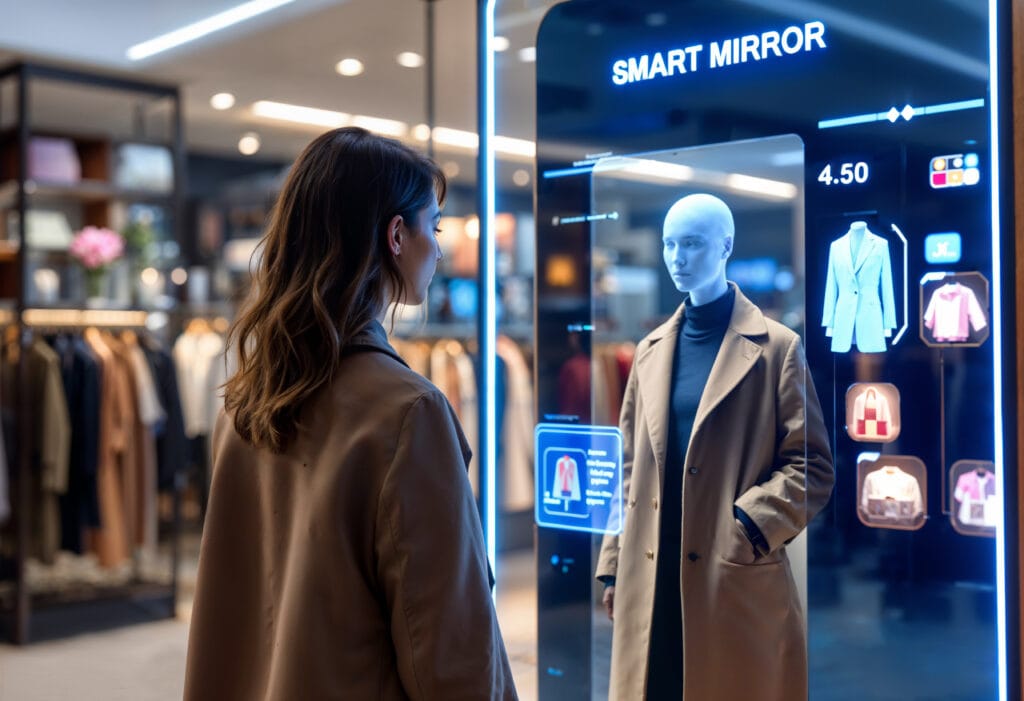Google is reinventing online shopping through generative AI, transforming product discovery with advanced features that mirror its transformative approach to search. With recent updates, Google Shopping now offers AI-driven features like concise product summaries, personalized inspiration feeds, top product recommendations, and tools for finding the best deals. The tech giant leverages Gemini AI assistant to analyze over 45 billion product listings, creating intelligent, personalized shopping journeys. By utilizing generative AI for retail applications, not only top brands but also many promising startups across the globe are witnessing a significant increase in their ROI.
According to a McKinsey report, companies investing in AI are experiencing revenue growth of 3-15% and a significant sales ROI increase of 10-20%. As consumer expectations continue to evolve, forward-thinking brands are turning to advanced AI technologies to create hyper-personalized shopping experiences, optimize supply chains, and unlock new revenue streams.
From AI-driven product design to intelligent marketing strategies, generative AI is quickly becoming a critical requirement for gaining competitive advantage in the retail sector. It enables businesses to anticipate customer needs, streamline operations, and drive unprecedented growth in an increasingly digital marketplace.
What Are the Benefits of Leveraging Generative AI for Retail?
1. Cost Reduction
Generative AI automates various processes, including content creation, data analysis, and supply chain management, reducing the need for manual intervention. This lowers operational costs and increases efficiency. Retailers can reinvest these savings into innovation and growth while maintaining high-quality service and operations.
2. Data-Driven Insights
Generative AI processes massive datasets to provide actionable insights. It identifies patterns in consumer behavior, market trends, and operational inefficiencies, empowering retailers to make informed decisions. These insights drive better strategies in merchandising, marketing, and inventory management, ensuring a competitive edge in the market.
3. Enhanced Personalization
Generative AI enables retailers to create hyper-personalized shopping experiences by analyzing individual customer data, preferences, and browsing history. It can generate tailored product recommendations, customized marketing messages, and personalized styling advice that speak directly to each customer’s unique tastes and needs.
4. Improved Inventory Management
AI-powered predictive analytics optimize inventory levels by accurately forecasting demand, identifying potential stockouts, and suggesting optimal restocking strategies. This reduces waste, minimizes carrying costs, and ensures retailers maintain the right product mix, ultimately improving operational efficiency and reducing financial losses.
5. Dynamic Pricing Strategies
Generative AI can analyze market conditions, competitor pricing, demand fluctuations, and customer behavior in real-time to create intelligent pricing models. This allows retailers to implement dynamic pricing strategies that maximize revenue, clear excess inventory, and remain competitive in rapidly changing market environments.
6. Automated Content Creation
AI can generate high-quality, SEO-optimized product descriptions, marketing copy, and creative content at a scale. This reduces content creation costs, ensures consistency across platforms, and enables retailers to quickly update product information and marketing materials with minimal human intervention.
7. Advanced Customer Service
AI-powered chatbots and virtual assistants provide 24/7 customer support, handling multiple queries simultaneously with personalized, context-aware responses. These systems can resolve common issues, provide product recommendations, and escalate complex problems to human representatives, improving overall customer satisfaction.
“AI is an engine that is poised to drive the future of retail to all-new destinations. The key to success is the ability to extract meaning from big data to solve problems and increase productivity.”
– Azadeh Yazdan, Director of Business Development, AI Products Group
8. Predictive Trend Forecasting
By analyzing vast amounts of data from social media, sales records, and consumer behavior, generative AI can predict emerging fashion trends, consumer preferences, and product demand. This helps retailers make informed decisions about product development, purchasing, and marketing strategies.
10. Fraud Detection and Prevention
9. Advanced AI algorithms can detect unusual patterns, identify potential fraudulent activities, and prevent security breaches in real-time. This protects both retailers and customers, reducing financial losses and maintaining trust in the digital shopping ecosystem.
11. Omnichannel Experience Optimization
Generative AI helps create seamless shopping experiences across multiple channels by maintaining consistent customer profiles, personalizing interactions, and providing unified recommendations whether customers are shopping online, on mobile, or in physical stores.
12. Enhanced Visual Merchandising
Generative AI transforms visual merchandising by creating immersive shopping experiences. It generates realistic 3D product visualizations, dynamic displays, and virtual storefronts tailored to customer preferences. These visually engaging elements improve the online and in-store shopping experience, increasing customer engagement and conversion rates.
Amazon Nova AI – Redefining Generative AI With Innovation and Real-World Value
Discover how Amazon Nova AI is redefining generative AI with innovative, cost-effective solutions that deliver real-world value across industries.
Generative AI for Retail: Top 10 Applications
1. Personalized Product Recommendations
Generative AI transforms the shopping experience by creating hyper-personalized product suggestions that go far beyond traditional recommendation engines. By analyzing vast amounts of customer data, including past purchases, browsing history, and contextual preferences, AI can generate incredibly nuanced and accurate recommendations. This technology learns and adapts in real-time, creating a dynamic and engaging shopping journey.
- 360-degree customer profile analysis
- Real-time recommendation adaptation
- Cross-channel personalization
- Predictive purchase suggestions

2, Intelligent Chatbots and Virtual Assistants
Advanced AI-powered customer service solutions are revolutionizing retail interactions by providing instantaneous, context-aware support across multiple channels. These virtual assistants can handle complex customer queries, provide product information, offer styling advice, and even complete transactions with human-like conversation capabilities. They operate 24/7, reducing response times and improving overall customer satisfaction.
- Natural language processing
- Multilingual support
- Emotional intelligence integration
- Seamless escalation to human agents
3. Dynamic Pricing and Inventory
Optimization Generative AI enables retailers to implement sophisticated pricing strategies and inventory management techniques that respond to market conditions in real-time. By analyzing historical data, current market trends, competitor pricing, and demand forecasts, AI can generate optimal pricing models and inventory recommendations that maximize revenue and minimize waste.
- Real-time price adjustment
- Demand forecasting
- Automated restocking strategies
- Risk mitigation in supply chain
4. AI-Powered Product Design and Development
Generative AI is transforming product creation by generating design concepts, predicting trend directions, and assisting designers in developing innovative products. These AI systems can analyze consumer preferences, market trends, and historical design data to suggest new product variations, materials, and design elements that resonate with target audiences.
- Trend prediction
- Automated design variations
- Material and color trend analysis
- Rapid prototyping support
5. Personalized Marketing Content
Generation AI technologies are revolutionizing marketing by creating highly targeted, personalized content across various channels. From email campaigns to social media posts, generative AI can craft compelling, individualized marketing messages that speak directly to specific customer segments, increasing engagement and conversion rates.
- Dynamic content adaptation
- Multichannel marketing optimization
- Personalized messaging
- A/B testing capabilities
6. Virtual Try-On and Augmented Shopping Experiences
Generative AI enables immersive shopping experiences through advanced virtual try-on technologies and augmented reality solutions. Customers can now visualize products in their personal context, whether it’s clothing or makeup try-ons, placing furniture in their home, or experiencing products in unprecedented detail.
- 3D product visualization
- Realistic sizing and fit predictions
- Augmented reality integration
- Personalized styling recommendations
7. Predictive Customer Service and Issue Resolution
AI-driven systems can anticipate and proactively address potential customer issues before they escalate. By analyzing historical support data, customer interactions, and behavioral patterns, generative AI can predict potential problems and suggest preemptive solutions.
- Predictive issue identification
- Automated resolution suggestions
- Sentiment analysis
- Personalized support strategies
8. Supply Chain and Logistics Intelligence
Generative AI optimizes complex supply chain operations by providing predictive insights, recommending efficient routing, and identifying potential disruptions. These systems can generate comprehensive logistics strategies that reduce costs, improve efficiency, and enhance overall operational resilience.
- Predictive demand forecasting
- Route optimization
- Risk mitigation strategies
- Real-time logistics insights
9. Fraud Detection and Prevention
Advanced AI algorithms can identify sophisticated fraud patterns and potential security risks in real-time. By analyzing transaction data, user behavior, and complex network interactions, generative AI provides robust protection for both retailers and customers.
- Anomaly detection
- Behavioral pattern analysis
- Real-time risk assessment
- Adaptive security mechanisms
10. Sustainable Retail Practices
Generative AI contributes to more sustainable retail operations by optimizing resource allocation, reducing waste, and supporting environmentally conscious decision-making. These systems can generate strategies for more efficient production, inventory management, and waste reduction.
- Carbon footprint optimization
- Waste reduction strategies
- Sustainable product design
- Circular economy support
AI Agents Vs AI Assistants: Which AI Technology Is Best for Your Business?
Compare AI Agents and AI Assistants to determine which technology best suits your business needs and drives optimal results.
Success Stories from Leading Retailers Leveraging Generative AI
1. Amazon’s AI-Driven Recommendations
Amazon’s recommendation system, powered by sophisticated machine learning algorithms, generates approximately 35% of the company’s total sales. Their AI analyzes user browsing history, purchase patterns, and similar customer behaviors to create personalized product suggestions. The system uses collaborative filtering and deep learning techniques to predict customer preferences with remarkable accuracy, continuously improving through real-time data processing.
2. Levi Strauss & Co
Levi’s implemented generative AI to speed up its product design process, cutting design cycles times significantly. By analyzing consumer trends and preferences, the AI generated innovative designs that resonated with target audiences, enabling the company to launch products faster and stay ahead of competitors.
3, Nike’s Personalized Shopping Experiences
Nike’s AI-driven platform creates hyper-personalized shopping experiences. It uses computer vision and machine learning to scan customers’ feet, providing precise shoe sizing recommendations. Their recommendation engine analyzes user preferences, workout data, and social interactions to suggest personalized products, resulting in significantincrease in customer loyalty and engagement.
“AI has been powering retail for years, and retailers have only been scratching the surface of what’s possible. A combination of the right solutions and an intelligent approach to adoption and data management will help all retailers reap the benefits of AI.”
– Geoff Hueter, CTO, Certona
4. Sephora’s Virtual Makeup Try-On
Sephora’s Color IQ and Virtual Artist technologies leverage augmented reality and AI to provide personalized beauty experiences. The virtual try-on feature uses advanced facial recognition to allow customers to test makeup products virtually through their mobile app and website. This technology has increased online engagement by 40% and helped reduce product return rates by matching customers with more accurately suited products.
5. Google Shopping: AI-Enhanced Search
Through its Gemini AI assistant, Google Shopping delivers AI-generated briefs and personalized inspiration feeds. By analyzing over 45 billion product listings, this AI helps users find the right products faster, showcasing how generative AI enhances the retail shopping experience.
Stay Ahead of the Competition with Custom AI Solutions!
Partner with Kanerika for Expert AI implementation Services
Generative AI for Retail: Emerging Trends to Look Out for
1. Hyper-Personalized Shopping Experiences
Generative AI is pushing personalization to unprecedented levels, creating individualized shopping journeys that adapt in real-time to customer preferences, behaviors, and contextual data. These experiences go beyond product recommendations, offering tailored styling advice, personalized marketing, and dynamically curated content that feels uniquely crafted for each customer.
2. Augmented Reality (AR) Shopping
Generative AI-powered advanced augmented reality technologies are revolutionizing online product interactions. With the help of virtual try-on experiences, 3D product visualization, and immersive shopping environments, consumers may examine things in previously unheard-of detail, accurately bridging the gap between digital and real sales.
3. Voice Commerce and Conversational AI
Through natural language interactions, AI-driven voice assistants are developing to offer more complex shopping experiences. Through user-friendly voice-based interfaces on a variety of platforms and devices, these systems can comprehend complex inquiries, provide tailored recommendations, execute transactions, and deliver thorough product information.
4. Emotional Intelligence in Customer Service
Advanced AI is developing sophisticated emotional intelligence capabilities, allowing for more contextually aware and sympathetic customer interactions. Across several customer care touchpoints, these technologies may generate more complex and human-like conversation, identify client emotion, and offer tailored support.
Alpaca vs Llama AI: What’s Best for Your Business Growth?
Discover the strengths and advantages of Alpaca vs Llama AI to determine which technology best fuels your business growth and innovation.
Case Studies: Kanerika’s AI Expertise
1. Impactful CRM Dashboard Solution Powered by ChatGPT
A reputed ERP provider that specializes in enterprise-level Customer Relationship Management (CRM) required a user-friendly and intuitive ERP software application and its UX. They also wanted to have an exceptional dashboard to complement their CRM—an effective tool for managing and analyzing sales data.
Kanerika’s Solutions
By leveraging technologies like Open AI’s CHatGPT and Microsoft Azure, Kanerika offered the following solutions:
- Leveraged Generative AI in CRM to create a visually appealing and functional dashboard, ensuring effective data management
- Utilized AI for creating dashboards that provided a holistic view of sales data, allowing businesses to identify KPIs, resulting in improved outcomes
- Enabled an intuitive UI that improved customer satisfaction, noted higher adoption rates, and gave a competitive edge

2. Optimizing Production and Supply Chain through AI Implementation
The client is a frontrunner in the USA’s perishable food production domain.
The client faced challenges with inaccurate production due to a lack of AI implementation and sole reliance on historical data for demand forecasting, leading to customer dissatisfaction. Additionally, production planning and scheduling issues across vendors caused delays, quality problems, and revenue loss.
Kanerika solved their challenges by:
- Implementing AI and ML algorithms, factoring in weather and seasonal changes, to improve demand accuracy and enhance decision-making.
- Utilizing AI in production planning to reduce wastage and maximize revenues.
- Integrating an AI-based demand forecasting engine with the client’s ERP system, enabling seamless real-time decision-making.

3. Facilitating AI in Finance Modelling and Forecasting
The client is a mid-sized insurance company operating within the USA.
The client faced challenges due to limited ability to access financial health, identify soft spots, and optimize resources, which hindered expansion potential. Vulnerability to fraud resulted in financial losses and potential reputation damage.
Kanerika Solved their challenges by:
- Leveraging AI in decision-making for in-depth financial analysis
- Implementing ML algorithms (Isolation Forest, Auto Encoder) to detect fraudulent activities, promptly minimizing losses.
- Utilizing advanced financial risk assessment models to identify potential risk factors, ensuring financial stability.

Transform Your Retail Operations with Kanerika’s Cutting-Edge AI Solutions
At Kanerika, we specialize in designing and implementing custom AI solutions tailored to meet the unique needs of retailers. From accurate demand forecasting to inventory optimization and smart product pricing, our AI-driven solutions empower retailers to operate more efficiently and stay ahead in a competitive market.
By integrating AI into your retail processes, we help you predict market trends with precision, ensure optimal stock levels, and implement smart pricing models that boost profitability. Our solutions not only reduce costs but also enhance customer satisfaction by delivering personalized shopping experiences.
With Kanerika as your partner, you gain the tools and insights needed to drive innovation, efficiency, and growth. Whether it’s enhancing operational agility or future-proofing your business, we are here to ensure your retail enterprise stays ahead of the curve. Let’s build the future of retail together.
Take Your Retail Business to the Next Level with AI Integration!
Partner with Kanerika for Expert AI implementation Services
Frequently Asked Questions
How is generative AI used in retail?
Generative AI is used in retail for creating personalized product recommendations, designing marketing content, optimizing inventory, and enabling virtual shopping assistants. It helps retailers streamline operations, predict trends, and enhance customer experiences, driving engagement and profitability while reducing operational inefficiencies.
. How is AI used in retail stores?
AI in retail stores powers smart shelves, tracks inventory levels, analyzes foot traffic, and enables cashier-less checkout systems. It also provides real-time personalized promotions and customer insights, improving the shopping experience and operational efficiency through advanced data analytics and automation.
What is Generative AI examples?
Examples of generative AI include creating product descriptions, personalized marketing emails, designing new clothing styles, and generating virtual try-ons for apparel. It also powers AI-driven chatbots and virtual assistants for better customer interaction and support.
What is one application of ChatGPT mentioned for the retail industry?
ChatGPT is used in retail for enhancing customer service by handling queries, providing product recommendations, and resolving issues. It ensures quick, accurate responses, improving customer satisfaction and reducing support team workloads.
What is the future of AI in retail?
The future of AI in retail includes more personalized shopping experiences, advanced automation, sustainable supply chain practices, and enhanced predictive analytics. AI will enable smarter decision-making, improving customer satisfaction and profitability while driving innovation in e-commerce and brick-and-mortar stores.
How does Amazon use AI?
Amazon uses AI for dynamic pricing, personalized product recommendations, and optimizing delivery routes. Its AI-powered systems like Alexa and cashier-less Amazon Go stores enhance customer experiences, while predictive analytics and demand forecasting improve supply chain efficiency.
How to boost retail sales with AI-driven applications?
Retail sales can be boosted by AI-driven applications that offer personalized recommendations, optimize pricing strategies, improve inventory management, and enhance customer support with AI chatbots. These tools increase customer satisfaction, reduce costs, and drive higher engagement and repeat purchases.









